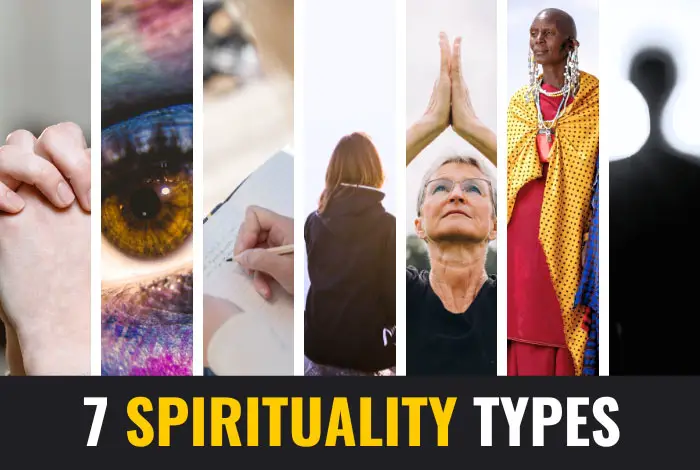Disclosure: There might be affiliate links on this page. As an Amazon Associate, I earn from qualifying purchases. This means I will earn a commission if you decide to make a purchase through my links but it will be at no additional cost to you.
Exploring spirituality can be a rewarding journey. Every person has a unique spiritual path, and there are many different types of spirituality to explore, each with its own benefits and drawbacks. The various types of spirituality can be categorized according to their practices, beliefs, and experiences. To find the best path for you, it is essential to understand the different types of spirituality available.
In this blog post, we will take a look at 7 main types of spirituality, their potential pitfalls, and how you can choose the best path for you.
7 Different Types of Spirituality
1. Traditional Spirituality
Traditional spirituality is based on established religious traditions such as Christianity, Islam, or Hinduism. It often involves showing reverence towards a particular deity or spiritual teacher and following the teachings and customs of the specific religion.
Examples of practices include structured religious practices, such as prayer or worship; texts, such as holy scripture and Dhammapada; and community activities organized by a religious institution. Reading and studying religious texts and spiritual scriptures can offer profound insights and guidance.
Traditional spirituality can also offer community and support for individuals seeking to connect with their faith. However, those seeking more personalized spiritual experiences may need to look beyond religious doctrines and go deeper.
Suitable for:
- Spiritual seekers who prefer to follow structured rituals and rules that are already defined for them.
- People who prefer to practice spirituality in a community setting.
- Those who already have an existing faith and are looking to explore their faith more deeply to discover personal meaning.
Potential Pitfalls:
- Strict adherence to certain teachings may prevent individuals from exploring other spiritual paths that can be beneficial to them.
- Religion is not the same as spirituality. Although religion can serve as a gateway to spirituality, performing rituals without understanding their true essence is insufficient for a deeper spiritual connection.
- One’s relationship with the divine can also become clouded by feelings of obligation or guilt if the rituals are not kept up with.
Read my articles on top books for beginner buddhists and best books on taoism.
2. Metaphysical Spirituality
Metaphysical spirituality is about connecting to a higher consciousness within ourselves or universal energy. It focuses on personal exploration, developing intuition and inner knowing, and understanding the holistic nature of reality.
Metaphysical spirituality is about the interconnectedness between life’s energy and the physical world. It involves gaining an understanding of how energy manifests in our lives and utilizing this knowledge to guide us on our spiritual journey. It can provide answers to questions that we cannot explain with our limited human perception.
Possible approaches include practices like meditation, astrology, crystal healing, tarot reading, numerology, aura cleansing, and energy healing.
Suitable for:
- Those who are inquisitive and want to explore the connection between the physical and spiritual realms.
- Spiritual seekers who are open to using esoteric practices as part of their spiritual journey.
- People looking for alternative therapies and healing modalities.
Potential Pitfalls:
- It can become too focused on manifesting material desires, instead of focusing on inner growth or self-improvement.
- It can lead to detachment from physical reality if not grounded in practicality.
- It is too abstract and can be difficult for an individual to differentiate between pseudoscience and genuine metaphysical teachings.
Read my articles on best law of attraction books, best books on chakras, best books on feng shui, best books on energy healing, and best books on intuition.
3. Humanistic Spirituality
Humanistic spirituality focuses on the individual’s psychological and emotional development and self-actualization. It emphasizes personal growth, self-reflection, and self-awareness.
Humanistic spirituality helps us to overcome challenges, develop resilience, and live a more meaningful and fulfilling life. It involves understanding how our thoughts, emotions, and behavior affect our life circumstances. It challenges the beliefs that are holding us back and the narratives that our egos create.
Here are some examples of practices that you can follow: mindfulness, gratitude practices, self-care activities, journaling, inner child work, shadow work, and counseling.
Suitable for:
- Those who are interested in exploring their inner self more deeply.
- People seeking meaning in their lives or looking to overcome negative patterns of behavior.
- Individuals who are willing to take responsibility for their life circumstances and seek personal growth as part of their spiritual practice.
Potential Pitfalls:
- It can become too individualistic, ignoring the social aspects of our spiritual journeys.
- Endless introspection can lead to depression or anxiety if we become too analytical or delve too deeply into our wounded psyche.
- Without exploring deeper metaphysical wisdom, we may not see the spiritual perspective and solution to our problems.
Read my articles on best inner child healing books, best books on trauma, best mindfulness books, and best enneagram books.
4. Philosophical Spirituality
Philosophical spirituality is about looking at the ideas of ancient philosophers. It is about thinking deeply about life, reality, truth, and purpose. People who study it talk to others to learn more.
It encourages us to think critically, question assumptions, and develop our own personal philosophy on life. It also helps us gain a better understanding of our place in the world and the purpose that drives our actions.
Here are some examples of practices that you can follow: reading philosophical texts or poems, joining discussion groups, engaging in debates with others, and seeking wisdom from respected mentors.
Suitable for:
- Those who are looking to develop a deeper understanding of life and reality.
- Individuals who want to gain knowledge on various spiritual ideas, traditions, and teachings.
- People who enjoy discussing and debating with others as part of their spiritual practice.
Potential Pitfalls:
- It can become too intellectualized or overly analytical, leading to rigidity in our beliefs and a lack of creativity or imagination.
- If we don’t have an experienced teacher to guide us, we might find ourselves stuck in debates without gaining any new insights.
- When we focus too much on researching and getting the truth, we may go down a rabbit hole or spiritually bypass our emotions. It can also become too dry and uninspiring.
Read my articles on best Alan Watts books and best Rumi books.
5. Body-Based Spirituality
Body-based spirituality is about connecting to our physical body and its sensations as a means of spiritual connection. It involves practices like yoga, meditation, mindfulness, breathwork, tai chi, qigong, and other forms of physical movement.
It encourages us to become aware of and nurture our physical body, while also deepening our understanding of the spiritual realm. It can help us gain clarity on the interconnectedness between mind, body, and spirit. It also helps us develop better self-control, be more present, and cultivate inner peace.
Suitable for:
- Individuals who need more grounding and stability in their lives.
- Those who prefer physical activity or looking for a more active form of spiritual practice.
- People who are seeking an embodied form of spirituality that is practical and down-to-earth.
Potential Pitfalls:
- It can be too focused on the physical body and can become a form of escapism, leading to addiction or neglecting our spiritual essence.
- We may become too preoccupied with perfecting our postures and movements that we forget to connect to the higher realms.
- If done without proper guidance, it could lead to issues such as injury.
Read my articles on best meditation book for beginners.
6. Indigenous Spirituality
Indigenous spirituality is based on the customs and beliefs of indigenous people around the world. It focuses on having a strong connection with nature and understanding how everything is connected, like how the elements work together and how we are connected to our ancestors.
Indigenous spirituality may offer unique insight into the world, but it may also require learning and respecting ancestral traditions and practices. This spiritual path includes shamanism and the use of plant medicines such as ayahuasca, as well as practices like smudging, prayer, vision quests, rituals, and ceremonies.
Suitable for:
- Individuals who want to gain a deeper understanding of nature and the interconnectedness of all things.
- Those looking to reconnect with their ancestral roots and learn about tribal wisdom.
- People who are interested in connecting to plant medicine or Shamanic practices.
Potential Pitfalls:
- It can be difficult to find authentic teachers or mentors within indigenous communities as there are very few people who are still actively practicing and teaching their traditions.
- It can also be difficult to access the right resources due to geographical distance or cultural barriers.
- Unless done with an experienced teacher or guide, there is also the risk of physical harm due to plant medicine use or other practices.
Read my articles on best Don Miguel Ruiz books.
7. Spiritualism
Spiritualism is a spiritual path that focuses on connecting with the spirit world, either through mediumship or other forms of communication. It seeks to understand the mysteries of life, death, and the afterlife. As such, it involves communication with spirits in order to gain guidance and wisdom on life and its purpose.
Spiritualism can offer huge emotional relief such as hope and peace for people who have a difficult time processing grief and loss. Examples of practice include channeling, spirit communication, séances, automatic writing, psychic readings, mediumship, and dream interpretation. Spiritualists also believe in the power of prayer and meditation to connect with the spirit world.
Suitable for:
- Individuals who have experienced the death of a loved one, and need emotional support.
- Those who are seeking guidance from spiritual realms on life decisions.
- Those who are curious about the afterlife and interested in exploring life’s mysteries.
Potential Pitfalls:
- It can be emotionally draining and potentially pose physical risks when engaging in such practices.
- It can be dangerous to connect oneself to energies from other realms, especially if you don’t have proper guidance or don’t know how to protect yourself.
- It can also be difficult to know whether the messages being received are from a reliable source in the spiritual realm. It can be simply our own thoughts or emotions manifesting as messages.
Read my articles on best lucid dreaming books, best Brian Weiss books, best James Van Praagh Books, and best Abraham Hicks book.
How to Choose the Best Spiritual Path for You
1. Start with the spirituality type that you are the most interested in.
Individuals have unique personalities. For instance, as an INFJ, my preference for intuition and self-reflection leads me to spiritual paths like metaphysical and humanistic spirituality.
Someone who is very logical or traditional might not be open to practicing metaphysical spirituality and spiritualism at all. They might prefer a more philosophical and traditional approach to spirituality. Therefore, it is important to follow your own preference.
2. Research and learn about the different practices within your chosen spirituality type.
Within each spiritual type, there are different practices. Some of them may resonate with you, but some may not. Therefore, it is important to learn more about the various practices and experiment with them, so that you can determine which ones are right for you.
You can do this by reading books and articles on the topic or watching videos. At this stage, you are just dabbling and testing out the practices. If something doesn’t resonate with you or your belief system, you can discontinue it.
3. Go deeper and practice regularly.
Once you have determined what practices resonate with you, it’s time to go deeper. Start practicing regularly and incorporate the chosen spiritual practices into your daily life. This will help to strengthen your understanding of the spiritual path, as well as make it part of your routine.
When you are committed to the practice, you may want to sign up for a course or find a reliable teacher for more guidance.
4. Be mindful of potential pitfalls.
Whilst exploring your chosen spirituality type, it is important to be mindful of the potential pitfalls associated with it. Over time, your practice may not yield the same benefits it once did, or you may start to view it as a mere ritual or obligation. It’s essential that you regularly assess how you feel and reconnect with your original intention for engaging in the practice. Otherwise, it can become a chore and you may end up feeling disconnected or uninspired.
5. Be open to exploring other spirituality types.
Finally, it is important to remember that spirituality is an ever-evolving journey. You may find yourself drawn to other paths as well. Remain open to the possibility of exploring different types of spirituality and see what resonates with you. Who knows, you might discover something new and wonderful!
Spirituality is also broad. It encompasses more than just one practice or type. Incorporating different spiritual types can provide balance in your spiritual journey. For instance, if you often engage in philosophical spirituality, consider trying body-based practices to become more grounded and less prone to overthinking.
Final Thoughts
Now that you know more about the 7 main types of spirituality, it is time to create your own spiritual path and start walking it. It is important to remember that there isn’t a “one-size-fits-all” solution when it comes to exploring spirituality. So take your time to explore different spiritual paths and find those that resonate with your needs.
Remember that your spiritual journey is unique to you, and a combination of different types of spirituality and practices is what makes it so personal.
If you are interested in metaphysical and humanistic spirituality like me, please check out my spiritual books, Reconnect to Love and Love Your Body.










